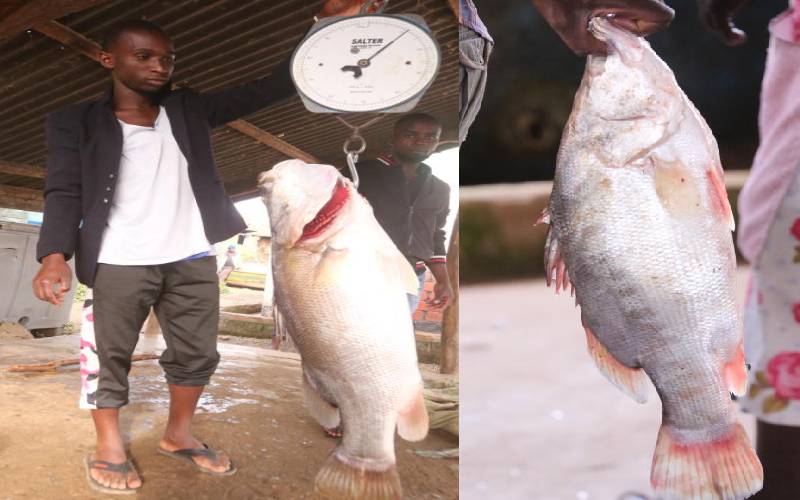
A fisherman weighs his heavy catch at Mageta island Siaya county. [Collins Oduor, Standard]
For some, it is a delicacy that must frequent their dining tables. But for others, it is the most profitable fish in Lake Victoria due to its highly valuable fish maws.
The Maws, or the fish air bladder, which is basically the stomach of the Nile Perch - locally known as Mbuta - are much sought after for their nutritious content. For consumers in Asia, this is actually an aphrodisiac.
For starters, one kilogramme of maws costs about Sh20,000. This has pushed more traders into an illegal hunt for Nile Perch.
And more than 65 years since introduction of the Nile Perch in Lake Victoria, scientists have been raising the alarm over its invasive contribution to the diminishing of other fish species. The Haplochromis species has been the worst affected.
Christopher Aura, a researcher at Kenya Marine and Fisheries Institute, says: “The Nile Perch feeds on haplochromine fish species. In the 1950s, before the Nile Perch, there were some 500 species in the lake. But some 200 species are now extinct,” said Aura.
The situation, scientists say, is dire as the disappearance of the small fish that are the primary meal for Nile Perch could soon go beyond the 200 already witnessed.
The Nile Perch itself is also threatened, as an underground web of dealings involving rogue fishermen using illegal nets and unscrupulous traders eyeing the export market target the fish.
On the flipside, fishermen claim the Nile Perch stock is declining at an alarming rate due to the reduction of its feeds, as well as illegal fishing in the lake. The Lake Victoria Fisheries Organisation has since pulled together scientists from Kenya, Uganda and Tanzania to conduct a stock assessment, besides stabilising the extreme ecological effects Nile Perch has had on other species.
A trade over its bladder is thriving and has pushed more fishermen to venture into the hunt for the Nile Perch despite dwindling stocks.
Sources say most of the Nile Perch caught do not reach the beaches and are instead cut up by the fishermen, with the maws removed and carefully packaged for export. The dead fish is then thrown back into the lake.
This could be the reason Nyanza beaches record low catch of Nile Perch despite a thriving black market for fish maws. China is one export market that has seen fishermen from Usenge, Kwoyo and Kendu Bay beaches collude with Ugandans to export fish maws.
Steven Onyango, a boat owner at Usenge, says he makes huge losses due to the illegal trade in Nile Perch. He says the fish is sold inside the lake. “So when the boats arrive, there is always just a handful of fish.”
Another fisherman said the high value placed on the Nile Perch means there is need to invest more in it. More fishermen have turned attention to the fish’s breeding areas and the fisher folk are aware that fish stocks have declined in the lake.
“We understand that Nile Perch also contributed to the loss of some of them because it eats other fish,” he said.
National Beach Management Unit chairperson Tom Guda says they have strived to end illegal trade in fish maws in the lake.
The situation is different in Uganda, where export of Nile Perch maws is done openly. Even the Uganda Fish Processors and Exporters Association proposed that the Ugandan Parliament bans local consumption of Nile Perch to increase its export.
But according to Vianny Natuganza, a scientist at the Institute of Fisheries Science and Marine Studies in Uganda, there is optimism that illegal trade in Nile Perch will end and restore balance in the ecosystem for other species.
 The Standard Group Plc is a multi-media organization with investments in media platforms spanning newspaper print
operations, television, radio broadcasting, digital and online services. The Standard Group is recognized as a
leading multi-media house in Kenya with a key influence in matters of national and international interest.
The Standard Group Plc is a multi-media organization with investments in media platforms spanning newspaper print
operations, television, radio broadcasting, digital and online services. The Standard Group is recognized as a
leading multi-media house in Kenya with a key influence in matters of national and international interest.











